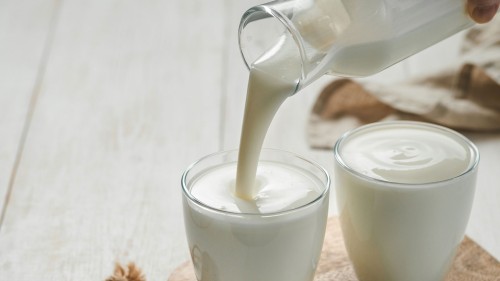10 Evidence-Based Benefits of Kombucha Tea, According to a Dietitian
Published on February 3, 2022
Medically Reviewed by Ana Reisdorf, MS, RD
From aiding in digestion to providing a host of powerful antioxidants, scientists are beginning to explore the potential health benefits of drinking kombucha tea.


Kombucha is a fermented tea drink made with black or green tea, bacteria, sugar, and yeast. The drink is believed to have originated in China more than 2,000 years ago.
In recent years, kombucha’s popularity has skyrocketed as a functional food with various potential health benefits.
Kombucha is made by mixing black or green tea with bacteria, sugar, and yeast and setting it aside to ferment for a week or more.
During this fermentation process, bacteria, acids, and a small amount of alcohol are produced.
Eventually, the bacteria and acids form a film on top of the liquid called a symbiotic colony of bacteria and yeast, or SCOBY.
SCOBY can then be used to ferment more kombucha.
The resulting liquid contains vinegar, lactic-acid bacteria — which can work as a probiotic — antioxidants, and B vitamins.
Due to its probiotic content, antioxidant activity, and vitamin profile, the health benefits of kombucha have been in the spotlight for several years.
The following are the potential benefits of drinking kombucha.
1. Provides Probiotics to Improve Gut Health
The probiotics found in kombucha may play a role in promoting the growth of healthy bacteria in your gut.
One 2014 study identified the genus Lactobacillus in kombucha. Lactobacillus is a common type of probiotic that can have multiple positive effects in the body, depending on the species and strain. (1, 2)
These friendly bacteria can help you digest food, absorb nutrients, and fight off harmful bacteria that may cause gastrointestinal symptoms such as diarrhea, all while supporting your immune system.
Summary
Kombucha contains probiotics that may help promote the growth of healthy bacteria in your gut. Having a balance of healthy gut bacteria can help with digestion, absorption of nutrients, warding off diarrhea, and supporting your immune system.
2. Contains Antioxidants
Antioxidants are natural compounds that fight free radicals in your body. Free radicals are unstable molecules that can damage your cells and speed up the aging process.
Kombucha is rich in antioxidants such as polyphenols and flavonoids.
One 2021 study suggests that kombucha’s powerful antioxidant activity may help prevent body cell damage, certain inflammatory diseases, and immune system breakdowns. (3)
Summary
Kombucha provides antioxidants that may prevent cell damage, reduce your risk of inflammatory diseases, and help to support your immune system.
3. May Help Reduce Your Risk of Heart Disease
Along with following a healthy diet rich in fruits, vegetables, whole grains, lean protein, and healthy fats, drinking kombucha may also support your heart health.
LDL (“bad” cholesterol) and HDL (“good” cholesterol) are both markers for heart disease.
One 2015 study found that rats given kombucha had lower levels of LDL cholesterol and higher levels of HDL cholesterol. (4)
While preliminary research sounds promising, more extensive human studies are needed to further analyze the link between drinking kombucha and heart health.
Summary
While more research is needed, drinking kombucha may support your heart health by lowering your LDL (“bad cholesterol”) and raising your HDL (“good cholesterol).
4. May Help Manage Blood Sugar Control
Along with a healthy, balanced diet, someday kombucha may be used to help people with diabetes improve their blood sugar control.
According to one 2019 review, in one small study of 24 adults with type 2 diabetes, drinking kombucha for three months enabled the study participants to lower their mean blood sugar levels. (5)
Additionally, one older study of diabetic rats found that kombucha slowed the digestion of carbohydrates, which helped to lower blood sugar levels. (6)
The study also revealed that kombucha improved liver and kidney function among the rats.
Kombucha made from green tea may be of particular benefit for people with diabetes as green tea has been linked to lower blood sugar levels. (7)
Summary
According to one small study, drinking kombucha is associated with improved blood sugar control. Kombucha made with green tea may benefit people with diabetes as green tea has been linked to lower blood sugar levels.
5. May Help Reduce Your Risk of Cancer
Due to its powerful antioxidant content, kombucha may help prevent certain types of cancer.
One 2013 study examined the anti-angiogenic (a treatment that stops tumors from growing their own blood vessels) effect of kombucha and found that kombucha significantly decreased the survival of prostate cancer cells. (8)
It is important to note that the research analyzing the effects of Kombucha on cancer cells is in a laboratory setting.
More research is warranted to further explore the connection between kombucha and a reduced risk of developing cancer using human subjects.
Summary
While more research is needed, kombucha’s antioxidant activity may help prevent certain types of cancers, like prostate cancer.
6. Provides Vitamins
While vitamin levels will vary from batch to batch, kombucha contains a wide variety of B vitamins, including B12, B6, and B1. (9)
The B vitamins play an essential role in helping your body make energy from food, forming red blood cells, and supporting your immune system.
The vitamin levels in kombucha aren’t huge compared to those found in supplements; however, they are more bioavailable, or more easily absorbed.
Kombucha also contains vitamin C, a powerful antioxidant that helps to produce collagen, enhances wound healing, and boosts your immune system.
Summary
Kombucha provides a variety of B vitamins and vitamin C, which can support your overall health and wellbeing.
7. May Help Boost Metabolism
You may be wondering: Can kombucha help you lose weight?
Drinking kombucha may provide similar benefits to drinking green tea, including providing a boost for your metabolism.
Research shows that drinking green tea may help increase the number of calories you burn and may also help reduce the accumulation of fat around your abdomen. (10)
Summary
Kombucha made with green tea may boost your metabolism and reduce abdominal fat accumulation.
8. Can Help Reduce Inflammation
Eating a healthy diet that includes fermented foods like kombucha tea may be a way to reduce chronic inflammation.
Chronic inflammation is associated with conditions such as heart disease, type 2 diabetes, rheumatoid arthritis, respiratory illnesses, and chronic stress. (11)
The teas used to make kombucha provide polyphenols, which are compounds that act as antioxidants and can reduce inflammation throughout your body, reducing your risk of chronic diseases. (12)
Summary
The polyphenols found in the teas used to make kombucha act as antioxidants that can reduce inflammation and your risk of chronic disease.
9. May Help Strengthen the Immune System
The probiotics found in kombucha may play a role in enhancing your immune system.
Your gut is home to roughly 70% of your immune system, which suggests that when you support your gut with probiotics from kombucha, you are also supporting a healthy immune system. (13)
Summary
Your gut and immune system are closely connected; therefore, the healthy bacteria in kombucha can support a healthy immune system.
10. May Help Support Your Mental Health
The probiotics kombucha provides may help support your mental health because of the powerful connection between your gut and brain, known as the gut-brain axis. In fact, your “feel good” neurotransmitters, serotonin and dopamine, are actually produced in your gut.
One 2017 systematic review found that probiotics can help alleviate depressive symptoms, suggesting that optimal gut health is essential for mental health. (14)
Summary
The probiotics in kombucha may help support your mental health due to the powerful connection between your gut and brain, known as the gut-brain axis.
Tips on Incorporating Kombucha into a Healthy Lifestyle
Along with a healthy lifestyle, this fermented beverage may support your overall health and well-being by aiding in digestion, boosting your immune system, and providing a variety of vitamins and antioxidants.
The following are tips on how to incorporate kombucha into your healthy lifestyle.
Drink It Before Breakfast
The probiotics in kombucha may survive best when taken before your meal. Additionally, the caffeine in kombucha may provide a nice kick of energy before you start your day.
Keep in mind that drinking kombucha on an empty stomach may cause gastrointestinal upset if you’re not used to it.
Drink It with Meals
Drinking kombucha with your meals may aid your digestion and help make you feel fuller for longer. This may be useful for people who are trying to lose weight.
Replace Your Soda with Kombucha
Kombucha offers a similar fizzy, sweet drink as soda but without the empty calories and artificial chemicals.
Replacing your soda with kombucha will help reduce your calorie intake and provide a host of helpful nutrients.
Use Kombucha to Dress Your Salads
Tired of your basic olive oil and vinegar mix salad dressing? Kombucha makes a great alternative to vinegar.
Stir equal parts kombucha with your favorite olive oil, some lemon juice, and spice to taste and voilà – a simple, healthy salad dressing to compliment any meal.
Make Kombucha Popsicles
Store-bought popsicles are loaded with sugar and artificial ingredients.
Use a popsicle tray, add your favorite kombucha and some fresh fruit, and pop the trays in your freezer overnight for a delicious and healthy treat.
Start Off Slowly
If you are new to drinking kombucha, it’s best to start off slowly. If you drink too much at once, you may experience stomach discomfort and bloating.
According to the Centers for Disease Control, you can safely drink 4 ounces of kombucha one to three times per day. (15)
Additionally, incorporating other fermented foods like yogurt, kefir, sauerkraut, tempeh, and kimchi into your diet can also help promote the growth of beneficial bacteria.
Summary
You can drink kombucha first thing in the morning or with your meals. Kombucha can be used to make anything from salad dressings to popsicles. The CDC recommends drinking no more than 4 ounces of kombucha one to three times per day.
Frequently Asked Questions
Can you drink too much kombucha?
Kombucha is safe to drink in moderation. As a general recommendation from the CDC, you should limit your intake to 12 ounces per day, or less.
Drinking more than that may cause gastrointestinal upset, headaches, and tooth decay. (16)
If you have any health conditions or are pregnant, you should speak to your doctor about whether or not drinking kombucha is safe for you.
Is raw kombucha safe to drink?
If raw kombucha has been carefully made using proper cleaning precautions, it should be safe for most people.
Pasteurized kombucha is safer than raw because the pasteurization process destroys harmful bacteria. Unfortunately, pasteurization also destroys the helpful probiotic bacteria in the drink.
Does kombucha have alcohol?
Yes, all kombucha drinks contain some amount of ethanol.
However, most kombucha is considered nonalcoholic, which means it falls under the federal 0.5 percent alcohol by volume (A.B.V.) threshold.
Does kombucha have caffeine?
While caffeine is used to make kombucha, most of the caffeine is consumed by the SCOBY during the fermentation process.
There may be trace amounts (2–25 mg) of caffeine in kombucha versus 80–135 mg found in an eight-ounce cup of coffee.
When is the best time to drink kombucha?
The best time to drink kombucha is first thing in the morning to help enhance the probiotic activity of the drink.
However, those with a sensitive stomach may prefer to drink kombucha with a meal, which can help with digestion.
What are the best kombucha brands?
The best kombucha brands will steer clear from a lot of added sugar and artificial flavorings. Look for brands that contain no more than 5 grams of sugar per serving and those with a simple ingredient list.
For example, the ingredient list should contain tea, the type of sugar used in the fermentation process, and live cultures, in addition to any whole-food health enhancers like ginger or turmeric.
Some brands to consider include Health-Ade, GT, Synergy raw, Brew Doctor, and Suja Organic.
The Bottom Line
From improving your digestion to preventing chronic illnesses, kombucha has been linked with many potential health benefits.
While more research is needed to fully understand these potential health benefits, kombucha remains a healthy alternative to sugar-laden drinks like soda.
At WellnessVerge, we only use reputable sources, including peer-reviewed medical journals and well-respected academic institutions.
- Sequence-based analysis of the bacterial and fungal compositions of multiple kombucha (tea fungus) samples:
https://pubmed.ncbi.nlm.nih.gov/24290641/ - Beneficial Properties of Probiotics:
https://www.ncbi.nlm.nih.gov/pmc/articles/PMC5031164/ - All Aspects of Antioxidant Properties of Kombucha Drink:
https://biointerfaceresearch.com/wp-content/uploads/2021/08/20695837123.40184027.pdf - Protective effect of kombucha on rats fed a hypercholesterolemic diet is mediated by its antioxidant activity:
https://pubmed.ncbi.nlm.nih.gov/25856715/ - Kombucha: a systematic review of the empirical evidence of human health benefit:
https://www.sciencedirect.com/science/article/pii/S1047279718307385 - Hypoglycemic and antilipidemic properties of kombucha tea in alloxan-induced diabetic rats:
https://pubmed.ncbi.nlm.nih.gov/22591682/ - Effect of green tea on glucose control and insulin sensitivity: a meta-analysis of 17 randomized controlled trials:
https://pubmed.ncbi.nlm.nih.gov/23803878/ - Downregulation of signalling molecules involved in angiogenesis of prostate cancer cell line (PC-3) by kombucha (lyophilized):
https://www.sciencedirect.com/science/article/abs/pii/S221052391200044X - A review on health benefits of kombucha nutritional compounds and metabolites:
https://www.tandfonline.com/doi/full/10.1080/19476337.2017.1410499 - Efficacy of a green tea extract rich in catechin polyphenols and caffeine in increasing 24-h energy expenditure and fat oxidation in humans:
https://pubmed.ncbi.nlm.nih.gov/10584049/ - Chronic inflammation in the etiology of disease across the life span:
https://www.nature.com/articles/s41591-019-0675-0 - Polyphenols, Inflammation, and Cardiovascular Disease:
https://www.ncbi.nlm.nih.gov/pmc/articles/PMC3651847/ - Allergy and the gastrointestinal system:
https://www.ncbi.nlm.nih.gov/pmc/articles/PMC2515351/ - The effects of probiotics on depressive symptoms in humans: a systematic review:
https://www.ncbi.nlm.nih.gov/pmc/articles/PMC5319175/ - Unexplained Severe Illness Possibly Associated with Consumption of Kombucha Tea -- Iowa, 1995:
https://www.cdc.gov/mmwr/preview/mmwrhtml/00039742.htm - Health, Wellness, and Safety Aspects of the Consumption of Kombucha:
https://www.hindawi.com/journals/jchem/2015/591869/






